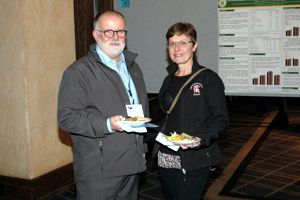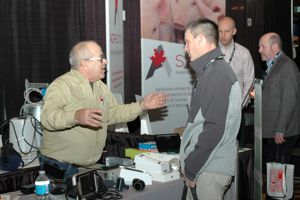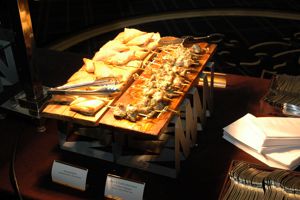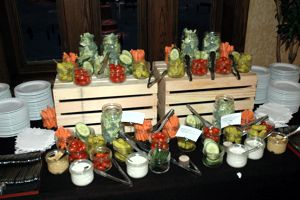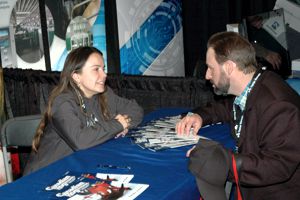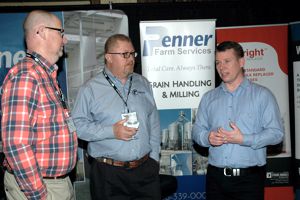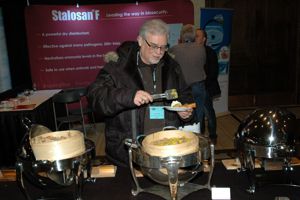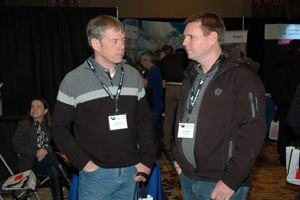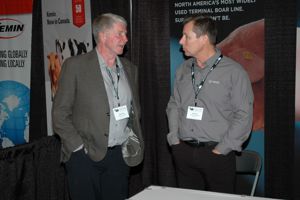Inside BPS Blog
News from the Meristem editors from inside the 2018 Banff Pork Seminar.
- Tell your network what happened at Banff Pork Seminar 2018
- Mark your calendar for BPS Jan. 8 to 10, 2019
- The changing face of pork production
- A stunning success story for farmers in social media
- Steve Savage: Unprecedented unity, creativity needed to shape agriculture
- BPS 2018 student science winners announced
- Larry Martin: Use futures and options to help manage risk
- Banff Pork Seminar 2018 Aherne Prize winners tell their stories
- The truth is no longer good enough
- Robust new technology driving a new future for pork production
- Big interest in antibiotic session at Banff Pork Seminar
- Mark Wilson, Zinpro: 2018 Foxcroft Honorary Lectureship
- Mark Chambers: BPS is "Looking ahead to the next generation"
- Delegates get a start on networking
- Sold out BPS 2018 kicks off a powerful week
- Tell the story of pork with #banffpork
- Download the BPS 2018 App
- BPS 2018 registration is maxed out
- Swine Innovation Porc welcomes delegates to BPS 2018
- Last minute tips for BPS 2018 delegates
- Still time to register for Banff Pork Seminar 2018
- Cutting edge technology highlights breakout session 5 at BPS 2018
- These people helped shape a great program for BPS 2018
- Aherne innovators, student awards highlight special BPS Wed. breakout session
- The latest on antibiotic developments, opportunities at Banff Pork Seminar 2018
- PIC welcomes friends and partners to BPS 2018
- Two veteran industry leaders talk savvy marketing at BPS 2018
- Unlocking the secrets of sow lifetime productivity: BPS breakout session 6
- Steve Savage talks ag threats, barriers and opportunities at BPS 2018
- Solving the special challenges of feeding the grow finish pig
- Check out sponsor functions during Banff Pork Seminar week
- Meet YouTube sensation Greg Peterson at Banff Pork Seminar 2018
- Get the inside story on mycotoxins at BPS 2018 breakout session 1
- Breakout 4: A new world of piglet management
- Registration deadline reminder for Banff Pork Seminar 2018
- A thank you to 2018 Banff Pork Seminar sponsors
- Get practical help on managing media and messaging at BPS 2018
- Fresh thinking on labor management at BPS 2018 breakout session 2
- Media attendance an important part of Banff Pork Seminar
- Banff Pork Seminar 2018 will inform, challenge industry
- Banff Pork Seminar extends Banff Springs Hotel contract
- Student science abstract deadlines Oct. 31, 2017
- 2018 Banff Pork Seminar Aherne Prize entry deadline Oct. 31, 2017
- Stay tuned for the latest news on Banff Pork Seminar 2018
Tell your network what happened at Banff Pork Seminar 2018
Date posted: January 12, 2018


The 2018 Banff Pork Seminar is history and it was a memorable one. A sold out crowd of 770 delegates travelled from across Canada and around the world to attend the event, Jan. 9 to11 in Banff Alta.
You can tell your network the highlights of what happened at the Seminar. News articles and much more from the 2018 seminar are highlighted in this Special Inside BPS Report and are available for use by media and industry information channels or individuals.
A short list of headline examples from news features and blog items available in this web-based report includes:
- A stunning success story for farmers in social media
- The changing face of pork production
- Steve Savage: Unprecedented unity, creativity needed to shape agriculture
- Larry Martin: Use futures and options to help manage risk
- Banff Pork Seminar 2018 Aherne Prize winners tell their stories
- Two winners share the Aherne Prize at 2018 Banff Pork Seminar
- The truth is no longer enough
- Robust new technology driving a new future for pork production.
- Mark Chambers: BPS is "Looking ahead to the next generation"
- Banff Pork Seminar 2018 will inform, challenge industry
- 2018 Banff Pork Seminar Aherne Prize entry deadline Oct. 31 2017
In addition there are about 40 blog items and selected speaker photos available for download.
The Banff Pork Seminar 2018 Special Report is available via link on the Banff Pork Seminar website at the Special Report link at www.banffpork.ca or directly at www.meristem.com.
Mark your calendar for BPS Jan. 8 to 10, 2019
Date posted: January 12, 2018
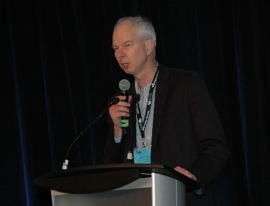 Dr. Ruurd Zijlstra
Dr. Ruurd ZijlstraAs the last of the 770 delegates prepared to leave the last presentation at the 2018 Banff Pork Seminar, Dr. Ruurd Zijlstra, co-program chair had a few closing thoughts.
The energetic closing speaker, Greg Peterson whose social media efforts reach millions of subscribers around the world was a fitting end to a high energy 2018 Seminar that prides itself at finding speakers at the leading edge of the industry, says Zijlstra.
The sold out conference that brought people from across North America and around the world, did not feel that crowded despite that turnout, he says. "We hope that gave you plenty of opportunity for networking and that you connected with the people you wanted to."
A thank you to sponsors was a reminder to delegates that without that sponsor support, the cost of attending would be significantly higher. He thanked all sponsors for their strong support again this year.
Keeping the program fresh is critical, says Zijlstra and he encouraged delegates to fill out the evaluation forms citing examples from the 2018 program that came directly from those suggestions. Those that do fill out their forms will have a chance at winning two free nights' accommodation at BPS 2019.
"Finally, mark your calendars for Banff Pork Seminar 2019," he says. "Dates are Jan. 8 to 10, 2019."
The changing face of pork production
Date posted: January 12, 2018
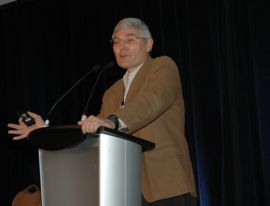 Ron Plain
Ron PlainWhen Ron Plain talks hog markets, people who make a living from those markets tend to listen.
The professor emeritus in the Department of Agricultural and Applied Economics at the University of Missouri-Columbia brings a farm background and solid experience in production economics to his presentations including a long history of industry service.
Plain has been a speaker at past Banff Pork Seminars and one that delegates rate highly. This year, in his Hog Market Outlook and Pricing Methods presentation to the 2018 Banff Pork Seminar, he looked at trends in the United States, Canada and globally and shared his insights on what may lie ahead for the hog sector.
Pricing
Negotiated sales for barrows and gilts, as well as for carcass weights, makes up only between two and three percent of total sales but has a longer reach than the numbers imply.
"This matters because those small numbers of negotiated sales drive the price for the rest of the industry," says Plain. "Half the US barrows and gilts in the United States are priced based on a formula that is linked in one way or another to the negotiated price. Of all hogs under contract, approximately 60 percent are under a price formula.
What difference does it make on price? Plain shared five-year data, 2013-2017, on both the base price for the hog and the net price after premiums and discounts to explain why negotiated sales continues to decline. "The price that those producers are getting for hogs is the lowest major category that is out there. It is a lot more work for negotiating but they are getting a lot less money for doing so."
Plain shared his thoughts on a solution for the disparity. "In my opinion, the industry needs to move to pricing hogs based on the cutout value."
Packing capacity
The percentage of packer owned hogs keeps increasing. Currently about 30 per cent of barrows and gilts raised for slaughter are packer owned and raised by the company that is going to slaughter them.
"They say hog producers can't stand prosperity. They will just breed more gilts and expand production until the profits go away. Same thing appears to be true of hog packers – when they make money they start building more packing plants and eventually the profits are going to get squeezed for them too," jokes Plain.
But it appears there is some truth to his observation. While the trend is usually one new packing plant every 10 years, there will be three new, large plants built in three years – Sioux City, IA and Coldwater, MI opened in 2017 and plans to open one in Eagle Grove, IA in 2019 are in place.
Cost of production
Corn prices are cheap compared to recent history but will likely continue to increase. "Soybean and corn futures will give us a forecast cost of production for hogs- the last few years we have been looking at a low cost of production," says Plain. 2017 saw the lowest cost of production since 2006 but the forecast is for an increase as feed costs rise and with the anticipation of a less desirable weather in the summer in the United States.
Productivity increases and evolution
Typically, the size of the swine herd is driven by last year's profitability. Canada has seen a steady increase in hog inventory in the last few years. Canada's export and import volumes remain steady and Canada and the United States continue to be each other's strongest trading partners.
Plain believes there is going to be a steady to modest increase for hog slaughter in 2018 and into early 2019.
The value of continually evolving production practices can be seen in the continual increase in numbers for things such as pigs-per-litter, which show a long-term trending increase year-over-year in the last 80 or more years. The growth is slowing because biologically there is a limit to how far this can increase, so Plain says not to expect any rapid increases in this going forward.
However, there is room to grow according to Plain in areas such as pigs per sow. "U.S. pork producers are showing that they are getting better and better at what they do and are improving upon what their parents and grandparents did. So, there is a lot of upside potential."
"Pork production per sow has seen a tremendous increase. In 1930, the average was 700 pounds of pork produced per sow in the United States. Last year we averaged 4,500 pounds of pork per sow. I think there is every reason to expect that this will continue to move higher."
"We produced more pork in 1999 than any other year in the century. In 1999, we had the fewest number of sows in 100 years. This is because the American and Canadian pork producers are much better than they were last year or a year ago. The challenge is that numbers indicate you are going to have be better again next year because the competition keeps getting tougher."
Overall there is a significant increase of about 5.3 per cent forecast for U.S. pork production in 2017-2018 which is the largest increase among the animal proteins.
Demand
Meat demand increases as the world population rises and is impacted by how well the economy is doing. When people have jobs and are making money, they buy more meat.
U.S. meat production for beef and pork in past years has climbed steadily each year, and turkey is fairly stable. Broilers continue to have steady and predictable growth. "I remember forecasting chicken production in the states and learning three things in life are certain- death taxes and three per cent more chicken than we had last year," says Plain.
An interesting outcome of the 2014 PED outbreak was a large increase to the average slaughter weights. Pork producers tried to increase the weights to accommodate the volume shortfall. "The average slaughter weights continue to rise and increase by about a pound per year – expect that to continue."
Bacon demand is steering cutout values, and has been for the last few years. "Bacon is the new 'in' food both at home and in foodservice," says Plain.
World pork trade – the amount of pork moving between countries – is fairly stable with slight increases in the last few years expected to continue.
A stunning success story for farmers in social media
Date posted: January 11, 2018
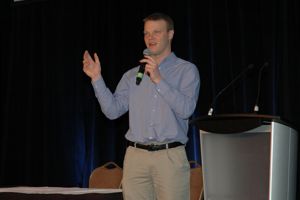 Greg Peterson
Greg PetersonTrust, transparency and vulnerability are essential to telling our story
Agricultural producers know in today's world they need to reach consumers.
Greg Peterson talks to millions of them. Literally.
In what surely ranks as one of the most successful social media programs in agriculture anywhere in the world, millennial Peterson and his young, energetic farming brothers use creativity, humor and confidence to tell the story of modern agriculture. It has been more successful than even they could have imagined when they started out.
The advocacy challenge
Agricultural advocacy has become increasingly important over the last few decades, Peterson told delegates to the 2018 Banff Pork Seminar in Banff, Alta. The number of people involved in production agriculture continues to shrink and the percentage of the population who grew up on a farm becomes lower each year.
"As part of the millennial generation, my brothers and I have grown up surrounded by many who know nothing of what farming is and who farmers are," he says. "We have spent much of our lives attempting to address misconceptions and defy stereotypes of what it means to be a modern-day farmer. Only recently did our idea to start making music videos on YouTube take what we'd tried to accomplish with the people around us to the masses."
Over the last five years, Peterson and his brothers have stumbled upon a communication platform that gives us a wider reach than anyone could have predicted. Their YouTube videos have been seen over 50 million times in over 200 countries. Their daily Facebook post interaction frequently eclipses 500,000 people.
Many of these people do not come from agricultural backgrounds, he says. "Teachers have been able to use our videos in schools around the world, even in urban areas. The humor and relatable content found in our videos is what drives our success and the popular songs we parody are the bridge we use to drive people from urban areas to our channel."
The new era
Ten years ago, much of what we are able to do on social media today was not possible. Smart phones have given us the ability to capture what we are doing on the farm and broadcast it to thousands of people at the click of a button, all from the seat of a tractor or wireless internet in our homes. At no time in history has such a powerful communication tool made reaching large groups of people so accessible.
Unfortunately, this surge in communication has led to a frustrating amount of misinformation being shared as well, says Peterson. Simple google searches of modern day agricultural technology result in overt negativity toward farmers and the agricultural industry.
"My brothers and I have realized over the years that not only should we be showing what farming looks like and what farmers do in our videos, we need to be prepared to answer the tough, controversial questions that people have about the technology farmers use."
Building trust
After watching these videos, people often have questions about farming practices, says Peterson "There is a sense of trust and credibility that is built after watching our family have fun together. This trust and credibility allows us to answer these questions with honesty and candor. It opens up a valuable opportunity to share with millions of people why farmers use the technology they do.
"Without that trust, many will reject information about tools such as GMOs, pesticides, preventative animal medicine and feed additives before they are even explained. We believe building trust is as big a part of advocacy as presenting the information.
"As we enter into the future of agriculture and advocating for what we do, we must remember that trust, transparency, and vulnerability is essential to telling our story. The need to advocate has never been clearer and will continue to increase. Each and every person in the industry needs to be prepared to share answers to hard questions. Social media and new technology allow us to do this in ways not possible in the past. Although the battle to educate may never end, we must not give up the conversation."
Steve Savage: Unprecedented unity, creativity needed to shape agriculture
Date posted: January 11, 2018
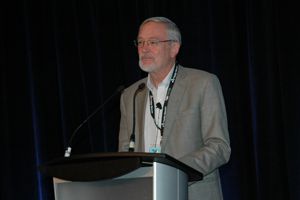 Dr. Steve Savage
Dr. Steve SavageGlobal food and fiber production gets high marks for performance over the past several decades but it has some significant challenges ahead never before faced in history. If it is going to succeed in the future it is going to have to work in unprecedented unity and creative strategies.
That was the message technology consultant and writer Steve Savage had to delegates to the 2018 Banff Pork Seminar, in Banff, Alta. Savage counts many leading companies among his clients and his writing is featured in leading publications such as Forbes Magazine.
Particularly positive for agriculture, he says, is that for the most part that production increase comes from per animal or per acre production increases rather than increasing the production area. While there are still definite limitations for developing countries the developed world enjoys an abundant, diverse and safe food supply that exceeds all historical precedents
Social license
Savage says major challenges are on the social license. That concept focuses on how societal pressures, permissions and perceptions influence the ability of an industry to succeed.
Agriculture's small population base reduces influence. There is declining overall investment in research and development. There is little appreciation of the historical value of science-based regulation, and regulation is influenced by politics and lack of harmonization.
There is widespread mistrust of the food system fueled by long-term marketing campaigns by industry segments or categories of technical rejection such as "No GMOs". Brand sensitive downstream food industry players are unwilling to support legitimate technology opportunities that are beneficial to producers and use their market leverage to protect brands and pursue market differentiation goals that conflict with options desirable for upstream players.
Some of those players use aggressive negative, often inaccurate descriptions of their competitors. They often supply funding for NGO groups that aggressively attack mainstream agriculture.
On top of that there are significant barriers to defense of social license. Disinformation by various groups such as ideologically-motivated activists representing extreme wings of environmental and animal rights movements.
Food demons and magical options have replaced considered analysis. Internet driven information has undermined trust in traditional authorities has people selecting information that only fits their Food marketing has companies looking for product differentiation making implied or actual safety or ethical claims. And agriculture has developed silos rather than working together.
BPS 2018 student science winners announced
Date posted: January 11, 2018
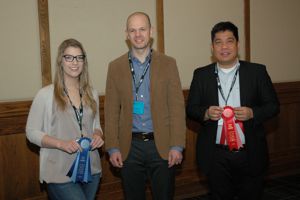 Dr. Ben Willing, University of Alberta presents awards to Danilo Sotto, University of Saskatchewan, (right) and Jill Hugman, University of Alberta
Dr. Ben Willing, University of Alberta presents awards to Danilo Sotto, University of Saskatchewan, (right) and Jill Hugman, University of AlbertaTwo young scientists at the 2018 Banff Pork Seminar (BPS) were presented with the R. O. Ball Young Scientist Award.
The award is named after Dr. Ron Ball, a long-time researcher and former BPS program director. The award recognizes graduate students who provide a best overall combination of good and relevant science, well-written abstract and excellent presentation.
First prize was awarded to Danilo Sotto, University of Saskatchewan for his presentation "Feeding acid-preserved high moisture barley and its interaction with particle size on weaning pig performance and nutrient digestibility."
Second prize went to Jill Hugman, University of Alberta for her presentation entitled Growth performance of weaned pigs fed raw, cold-pelleted, steam-pelleted or extruded field peas."
First place winner receives a $500 cheque and plaque and second price receives a $250 cheque.
Dr. Ben Willing, chair of the selection committee, presented the awards.
Larry Martin: Use futures and options to help manage risk
Date posted: January 11, 2018
 Dr. Larry Martin
Dr. Larry Martin"I work with a lot of people managing risk and pork futures are one of the hardest to trade."
Dr. Larry Martin started his presentation to the 2018 Banff Pork Seminar in Banff, Alta. with that statement. He had the tough task of covering what he teaches in a several day course on futures trading and risk management in a 45 minute plenary presentation. Judging by the number of people who lined up to talk to him as his presentation ended and people headed to break, the veteran market analyst and farmer risk management coach reached his goal.
Martin works with farm and agribusiness clients to manage price risk. He describes the issues in managing price risk as including failing to sell at high prices and then taking low ones; forward contracting at relatively low prices and foregoing opportunity; and, selling futures and then having large margin calls.
"Those are manifestations of fear and greed," he says. "We constantly have 'bull bag' and 'bear bag' of things to consider; that's what makes a market. It is particularly relevant in red meat at the moment - bearish supply numbers, bullish demand, uncertain trade policy. So the question producers should be asking is whether there are any techniques that can help manage some of these issues in uncertain markets."
The most frequent, but least relevant question people ask is, says Martin is "What do you think these hog prices are going to do"? That's the wrong question, he says. The right question is "As prices change, where do I take action and what action should I take"?
Producers need a plan, he says. The objectives are to characterize the conditions that give rise to the current uncertainty, define some methods of reading price charts that can help change the question from "where do I think prices are headed?" to "where should I take action"?
A plan should suggest and illustrate some trading rules for deciding when and what actions to take.
Martin walked his audience through six chart formations that they could use to help them interpret price trends, to decide where prices are going and what actions they should take.
One of the biggest challenges for producers is discipline, says Martin. Using charts systematically forces a person to take a view of where the market is relative to its recent past – helps identify highs and lows.
This information can be used for forward contracting, but producers don't need to use futures and options to get value from charts. Obviously, they are not always going to be correct, but it helps identify places with high probability of doing well on futures or options. It helps reduce "losses" by limiting margin payments, or it helps retrieve some of any price appreciation after contracting with Calls.
It gives disciplined decision rules that helps keep losses smaller.
Banff Pork Seminar 2018 Aherne Prize winners tell their stories
Date posted: January 11, 2018
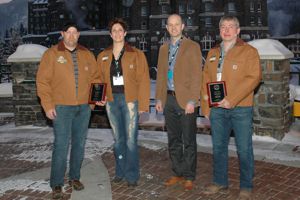 Two winners shared the F. X. Aherne Prize at the 2018 Banff Pork Conference. Left to right Lyle and Maaike Campbell, Birnam Pork, Arkona, Ont., Dr. Ben Willing, University of Alberta and Scott Hyshka, Mountain Vista / Sunterra Farms, Drumheller, Alta.
Two winners shared the F. X. Aherne Prize at the 2018 Banff Pork Conference. Left to right Lyle and Maaike Campbell, Birnam Pork, Arkona, Ont., Dr. Ben Willing, University of Alberta and Scott Hyshka, Mountain Vista / Sunterra Farms, Drumheller, Alta.The winners of the 2018 F. X. Aherne Prize for Innovative Pork Production were announced at the Banff Pork Seminar, Jan. 9 to 11, Banff, Alta.
This year two winners shared the prize. Winner for what they term the "ghost gate" were Lyle and Maaike Campbell, Birnam Pork, Arkona, Ont. Winner for the loose housing pen-within-a-pen innovation was Scott Hyshka, Mountain Vista / Sunterra Farms, Drumheller, Alta.
The Aherne Prize has developed quite a reputation in the pork industry says Dr. Ben Willing, of the University of Alberta, chair of the Aherne Prize committee. He says the quality and number of applicants is strong each year.
"This prize recognizes individuals who have developed either original solutions to pork production challenges or creative uses of known technology," says Willing. "Innovation is a powerful word today in any industry and we are pleased at Banff Pork Seminar to acknowledge these grassroots innovations in the pork industry."
The prize is named after industry icon, the late Dr. Frank Aherne, a professor of swine nutrition and production at the University of Alberta and a major force for science-based progress in the western Canadian pork industry.
Here, in their own words, are winners' descriptions of their innovations.
Ghost gates: Lyle and Maaike Campbell, Birnam Pork, Arkona, Ont.
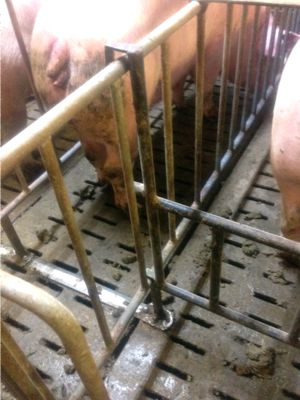
As progressive farmers we are always looking at improving our bottom line. In 2016 we decided to do a major overhaul of our quarantine barn to achieve better results. Knowing that eventually we would have to turn our main unit into loose housing we decided to introduce our gilts to this concept right away.
Along with group housing we also installed gilt crates for breeding. We quickly discovered after starting to use these crates that even with a short and narrower footprint they still left plenty of room for the gilts to move around. Usually this wouldn't be a big deal except that at the time of breeding when it made it difficult to maximize breeding potential. That's because during breeding, gilts moved substantially, turned around the odd occasion and at times even lost artificial insemination (AI) rods.
Using some leftover steel we had available we designed a "ghost gate" that could easily be placed behind the gilts while breeding them. The gates took maybe half an hour to an hour per gate to weld and cost less than $50 a piece since we used leftover steel. They easily slide behind the gilts and can be kept there for the duration of the breeding to promote nose-to-nose contact as well as decrease the chances of the gilts in the common pen pulling the AI rods out of the gilts being serviced.
We are not limited in lock in points for the gate since it can go behind each side bar on the crate. So body length of the gilt is not an issue. The gates aren't very heavy and when not in use are stored above the crates for easy access when needed.
We feel this innovation improves productivity, profitability and working conditions. The innovation has been welcomed by our employees. It makes daily breeding significantly easier and with less frustration. Their attention can go towards the actual breeding of the gilts rather than keeping the loose house swine away from the penned animals.
The gate is shown in photos attached. A video of this in action can be found at: https://youtu.be/PeOUhF0g32o.
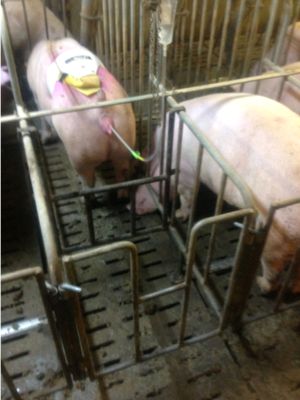
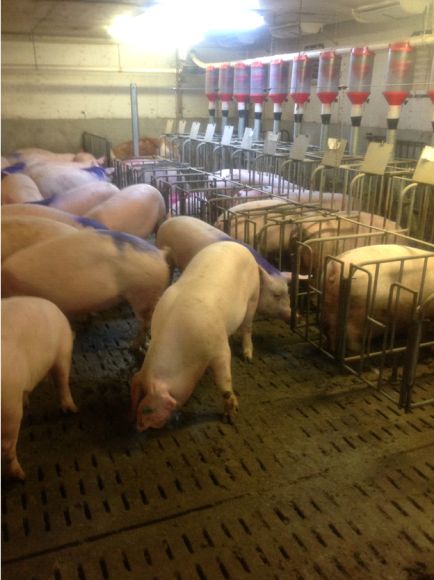
Isolation crate for loose housing system: Scott Hyshka, Production Manager, Sunterra Farms
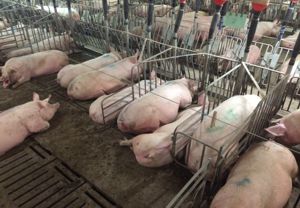
Mountain Vista Farm is a 4,000 sow farm east of Drumheller Alta. using competitive feeding shoulder stalls from 40 to 112 days gestation. The competitive feeding poses concerns of animal wellbeing and lost productivity that can result from aggression. There also is the issue with lost space from animals pulled from the loose pens that would not be refilled. The idea of the sick pen or collapsible crate within the loose pen was created to help resolve these issues.
The collapsible crate is in every loose pen. The pen can be opened to house an animal that requires segregation for additional nutrition or to have refuge from aggression (Photo 1, 2). If the pen is not needed it will remain folded up against the pen wall (Photo 3, 4).
The benefits of this are that the isolated animal remains in the loose pen with her pen mates. This allows the sow to re-enter the group when fit. The pen being within the loose pen does not require additional space in the farm to be set aside for sick or poor sows.
Win in future years
"The Aherne Prize is a popular one for the industry and one that will be continued in future years," says Ben Willing. "We hope that as producers see these prize winning innovations this year that they will be encouraged to enter their innovations at Banff Pork Seminars in upcoming years."
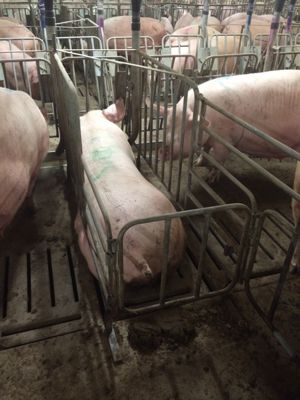
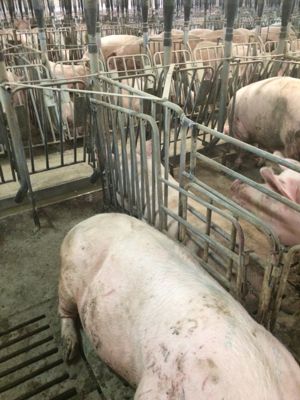
The truth is no longer good enough
Date posted: January 10, 2018
 Jeff Ansell
Jeff AnsellJeff Ansell pulls back the curtain on media practices and pitfalls.
Jeff Ansell has worked both sides of the desk. First as an investigative journalist, then in public relations and marketing, he now uses all those experiences to counsel companies who need help managing their messages when dealing with media.
Ansell says today truth is not good enough. "Truth and perspective have become casualties of a media that does its research on the run, while it writes history in a hurry."
Media is looking for good versus evil in a story Ansell says. The grey area is complicated and most media outlets are not interested in complicated today. This unfortunate truth is played out again and again when agriculture's bad news stories make the headlines and the good news is left uncovered.
As well, consciously or not, reporters use a bit of a boiler plate when telling stories. The media creates "characters", and set up their questions to bring their narrative to life. The characters are generally a victim, a villain, and a hero as well as a witness, an expert and a village idiot.
"In livestock agriculture, the victim is often the animal and the villain is often the farm or producer. The hero is too often an activist group," says Ansell. The witness role may be filled by a disgruntled employee and the expert will tell you how things ought to be, such as a veterinarian or government regulator. "The village idiot is the one who got us into this mess or made the problem worse. And reporters often expedite the process by filling the roles of villain and village idiot with the same person.
"If today the 'Headline was You' – how much faith would place in the media to get your story right? Because unless the reporter works for trade media and understands the complexities of the industry, they are likely to be biased from the start." Ansell says dealing with media is a bit of "an unnatural dynamic that bears no resemblance to everyday conversation," but those in the industry should not be afraid to speak up.
He adds what many in the agriculture industry already know – that when in a battle between facts and emotions, emotions always win. The impact of emotion should not be underestimated. "Ignore it at your peril. It is an avalanche."
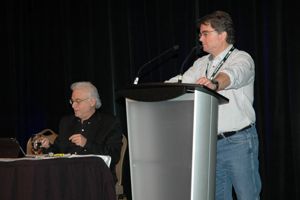 Ben Woolley, right, volunteer interviewee, and Jeff Ansell
Ben Woolley, right, volunteer interviewee, and Jeff AnsellA comparison of two Canadian meat crises – the XL Foods E.coli-related recall and Maple Leaf's listeria outbreak- illustrated what a difference addressing the issue and facing the media can make. "Every situation is different. But I will suggest that, more often than not, when bad news happens on your watch, you have to be among the most upset, the most aggrieved, the most outraged. You need to show your stakeholders you get it. And ideally, that would be genuine," says Ansell.
The value compass is a tool he uses to answer the question – What is the right thing to do? "The value compass reflects the words you would use to describe how you would like your stakeholders to view you. Words like honest, empathetic, accountable." He feels the compass is critical when you want to win in the court of public opinion.
Interviews are inherently stressful and Ansell says most people will go through a series of stages during a tough, combative interview. The first is to stop breathing, then to stop listening in an effort to formulate a response, and then "we enter an out-of-body experience." Strong messaging and clear answers are seldom achieved in this state.
Ansell shared his "Fluster Strategy" for producers who find themselves struggling in an ambush interview:
- Breathe – Media hopes you will answer right away instead of taking time to think about your answer, so breathe and give yourself some time.
- Repeat the questions – Ask the reporter to repeat the question "Excuse me, could you repeat the question?"
- Request clarification – Finally, ask them to clarify what it is they are looking for. "Help me understand the context of the question."
A highlight of the talk was a demonstration interview with volunteer Ben Woolley from Sunterra Farms. It showcased some of the pitfalls producers can encounter when speaking with media who have cast them as "the villain". Ansell demonstrated alternate ways for Woolley to answer the tough questions and then played the mock report that was generated with his original answers.
Ansell had these final words for the crowd of over 700. "When the headline is you, the messages you create, the narrative you construct, the answers you give, the comments you offer, the story you tell must truly reflect your value compass. And remember, the general public and the media don't care how much you know until they know how much you care."
Robust new technology driving a new future for pork production
Date posted: January 10, 2018
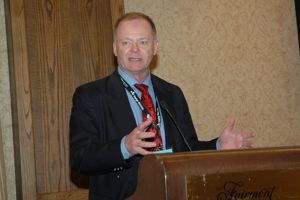 Lee Whittington, Prairie Swine Centre
Lee Whittington, Prairie Swine CentreExpect to see a dramatic increase in new technology coming into the pork industry as a host of manufacturers from diverse industries look at animal agriculture and attempt to measure or monitor welfare, environmental pressures and food safety with their technologies.
That was the first message Lee Whittington, president and CEO of the Prairie Swine Centre had for delegates to the 2018 Banff Pork Seminar in Banff, Alta. The second is that what will be needed is a method to evaluate systematically how well the products work, the data integrity and security, and the link to decision support software and methodologies required to get value out of the technology.
"If this is done correctly there is value for the industry, otherwise we do not need 'High-Tech Hype' technology just for the sake of technology that isn't moving us in a strategic direction of making pork the prime choice of meat protein for consumers world-wide," he says.
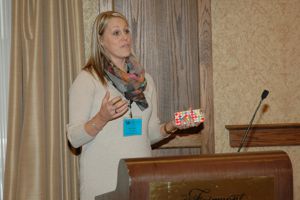 Amy Cronin, BPS advisory committee, session chair
Amy Cronin, BPS advisory committee, session chairWhittington knows a thing or two about new technology in this industry. The Prairie Swine Centre, a non-profit research corporation affiliated with the University of Saskatchewan focuses on near-market research, knowledge transfer and graduate student training. The Centre approaches industry issues combining original research with the evaluation of other research world-wide, assessing it for its application to the Canadian pork value chain.
Outside the barn
Whittington looks at a sample of what is coming, some promising research tools, some in early stages of commercialization. Here are some examples from outside the barn. Read full feature here.
Big interest in antibiotic session at Banff Pork Seminar
Date posted: January 10, 2018
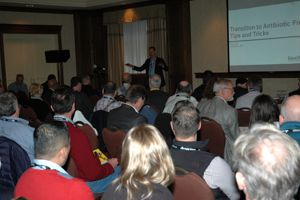 Seats were full
Seats were fullThe Swine Health and Antibiotics breakout session at the 2018 Banff Pork Seminar was standing room only - clearly a topic of interest at the conference this year. Speakers included Dr. Egan Brokoff of Prairie Swine Health Services who looked at new antibiotic use guidelines and regulation and industry guidelines.
Dr. Clayton Johnson from Carthage Veterinary Services Ltd. talked on raising animals without antibiotic, analysing the impact to biologic and economic performance. And Dr. Greg Wideman with South West Ontario Veterinary Services talked on strategies for the transition to antibiotic free production.
The session was kicked off by Brokoff who answered many of producers' frequently asked questions regarding the changes to antibiotic use regulations coming into effect.
Brokoff says changes will lead to "a heavy regulatory download to veterinarians and feed mills" in particular. And while producers will be dealing with the required increased oversight of their use of antibiotics by veterinarians, veterinarians in turn will also see an increased oversight of their work by government.
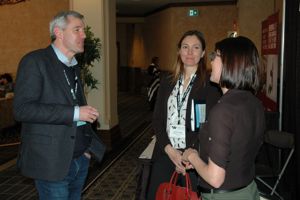 Dr. Egan Brokoff, let, and delegates
Dr. Egan Brokoff, let, and delegates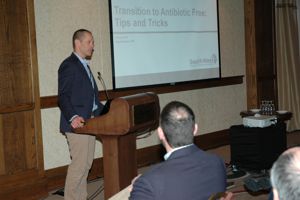 Dr. Greg Wideman
Dr. Greg WidemanMark Wilson, Zinpro: 2018 Foxcroft Honorary Lectureship
Date posted: January 10, 2018
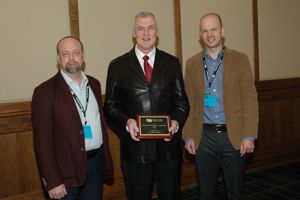 Left to right, Dr. Michael Dyck, University of Alberta, Dr. Mark Wilson, Zinpro, and Dr. Ben Willing, University of Alberta.
Left to right, Dr. Michael Dyck, University of Alberta, Dr. Mark Wilson, Zinpro, and Dr. Ben Willing, University of Alberta.There are few things more basic to pork production success than sow lifetime productivity.
Breakout session 6 at Banff Pork Seminar (BPS) 2018 brings together three speakers with compelling information on key aspects of this management area.
One of those speakers is the George Foxcroft Lectureship for 2018, Dr. Mark Wilson of Zinpro. That award is named after Dr. Foxcroft, the University of Alberta professor, research pioneer and industry icon.
"The George Foxcroft Lectureship in Swine Production allows the Banff Pork Seminar, in conjunction with the University of Alberta, to host speakers who are conducting high profile research that is applicable to the pork production industry and will potentially improve production efficiency," says Dr. Michael Dyck, University of Alberta, BPS program co-chair.
Dyck says each Foxcroft Lectureship recipient receives this award based on the quality of their research and the contributions made to the swine industry.
"The speakers in this breakout session were brought together to highlight various aspects of management and various considerations to make sure sows are being as productive as possible," he says. "The focus is how long a sow stays in the herd but also how long she is being productive."
Wilson's presentation was entitled "The impacts of lameness, longevity and inflammation on productivity and management of the sow herd."
Wilson brings significant experience and success to this presentation. A frequent speaker at National and International Swine events, he has spoken in 40 countries. He received his PhD at the University of Kentucky in reproductive physiology. He is currently one of the swine scientists of the research and nutritional services team of Zinpro Corporation. He is also is an adjunct professor for the University of Wisconsin and the University of Minnesota.
Mark Chambers: BPS is "Looking ahead to the next generation"
Date posted: January 10, 2018
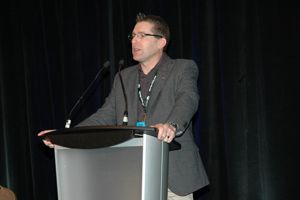 Mark Chambers,
Mark Chambers,Chair of the 2018 Banff Pork Seminar
The pork industry has much to be proud of, much to be thankful for and challenges to meet, says Mark Chambers, chair of the 2018 Banff Pork Seminar (BPS) in his opening remarks. But a sold out seminar this year shows it is looking ahead with renewed confidence.
"As I look at the theme of this year's seminar 'Looking ahead to the next generation' I think of all the changes we have seen and how production has improved. We are weaning more pigs than ever, finishing pigs to higher weights than in the past without giving up feed efficiency and doing this much more efficiently.
"This truly is a remarkable achievement and has been a collaborative effort from everyone who touches our industry such as researchers, nutritionists, genetics, technology, farm managers and staff. In the time I have been involved in the industry in Canada we have gone from weaning 18 piglets per sow per year to 30+ piglets per sow per year. That is an incredible feat."
That tremendous progress comes with challenges, adds Chambers. Today a fast moving and ever-changing environment means whether the industry likes it or not it is in the spotlight.
"We are facing changes on housing requirements, pressure on antibiotic use and environmental challenges. The next generation is going to have to embrace this and will need different tools than we have had in the last 30 years."
The 2018 Seminar has good speakers who will help address some of this, such as the first plenary "When the headline is you", he says. There is also a very good breakout that will address antibiotic use today and in the future.
"The move to group housing is not on the agenda this year as we have covered in years past, but I know there are many producers just like our company who have or are transiting to group housing. This brings a whole new set of challenges and at the beginning on a farm going from stalls to pens it's like going back to the 1950ies.
"Some of these things seem to have gone full circle, sows in pens, reduced antibiotics and some movement to free access farrowing crates. You would think this is the first Banff Pork Seminar not the 47th."
Chambers says the industry has had a pretty good run over the last few years, kick-started by PED.
"There is a restored faith for us to reinvest and in Canada we need to do that as we do have aging infrastructure. There has been new growth in the packing sector in the U.S. with an estimated increase in slaughter capacity of about seven million hogs per year and maybe another three million coming. This has helped keep the fall/winter prices from hitting rock bottom and adds reassurance to producers that there is demand for their hogs. Let's hope meat exports stay with the pace."
Chambers thanked his organizing committee for their work this past year and acknowledged the tremendous support received from sponsors. That support helps keep costs down for all delegates, he explained.
The BPS advisory committee continues to strive to bring the best seminar to you that it possibly can, he says. "Part of this involves thoroughly reviewing seminar evaluations. So please, take the time to fill them in. The information is invaluable to future seminars."
Chambers ended with a note on innovation. "Each year we have the FX Aherne Prize to recognize people with innovations. So often producers have some neat and cool innovations in the farms but as humble as they are we do not seem to think they are that innovative. I encourage you to make sure you think about this for next years and future seminars to submit potential innovations."
Sold out BPS 2018 kicks off a powerful week
Date posted: January 9, 2018
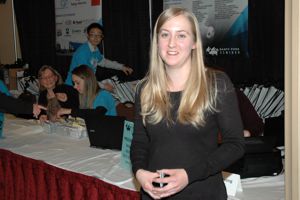
Ashley Steeple
The 740 delegates registered were busily working their way through the registration lines, and the reception for the 2018 Banff Pork Seminar was bubbling with energy.
It is the beginning of Banff Pork Seminar week in this world-renowned jewel of geography and there was no doubt the committee that has worked hard to pull this event together was feeling good about the start.
"We are grateful for the support this year and pleased to work with the Banff Springs Hotel to make this event a memorable one," says seminar coordinator, Ashley Steeple.
"One reason we have signed a new agreement extending our relationship with this hotel is the fact that meeting rooms and social areas are arranged in a convenient format. It is also very convenient to have so many social options are available right in the hotel making it easy for people to find networking and personal time.
"Networking and personal time are a big part of the reason people attend this seminar. We are confident they will leave here at the end of the week with an enjoyable experience behind them.
"As always, the organizing committee looks forward to feedback throughout the seminar about any aspect of the event," she says. "Filling out seminar evaluations is particularly important."
Tell the story of pork with #banffpork
Date posted: January 4, 2018
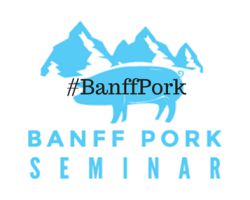
It is one of the most powerful opportunities the pork industry will have this year to tell the story of modern pork production. Simply follow the Banff Pork Seminar @BanffPork on Twitter and tweet enthusiastically from and around the 2018 Seminar using the hashtag #banffpork.
In three days of program and more days of industry activity 2018 Banff Pork Seminar (BPS) delegates will have a chance to tell the world about the absolute leading edge of progress in their industry.
They can talk the latest advances in animal and environmental care and a wide range of other scientific developments. There are national and international linkages to celebrate with speakers from across North America and around the world.
There are marketing and communications messages from some of the best minds in that business, eager to help the pork industry continually improve on connecting with consumers and society in general.
"If we work together we can use opportunities like this to create a tsunami of fresh information that showcases our industry in a positive light," says Chris Tokaruk of TTT Stock Company Ltd., communications chair on the BPS organizing committee. "It just takes a little teamwork."
Download the BPS 2018 App

Date posted: January 4, 2018
It's free, it's easy and it will make your trip to the Banff Pork Seminar 2018 simpler.
Optimize your conference experience and make the most of BPS 2018 with the new Banff Pork Seminar App.
You can view the agenda, find your sessions, read speaker biographies and abstracts and even find your way using the integrated floor-maps. You can also chat with fellow delegates, network with exhibitors and sponsors, stay up-to-date with conference announcements and so much more.
Search the App store for the "Crowd Compass AttendeeHub App" Download then search events for Banff Pork, or Visit https://crowd.cc/s/14rQ8.
Enjoy the seminar.
BPS 2018 registration is maxed out
Date posted: January 4, 2018
If you left registering for the Banff Pork Seminar (BPS) until the last minute you may be out of luck. The 2018 Seminar is officially sold out.
"We are delighted with the response for this year's seminar and are looking forward to an energetic delegate group," says Ashley Steeple, seminar coordinator. "Anyone who wants to attend and has not registered can contact the BPS at and ask to be put on a waiting list. We do not expect a lot of openings, but there may be some and this is the best way to be considered for those."
The other thing to keep in mind, says Steeple, is that with a full attendance seating in breakout sessions and meeting rooms will be tighter than normal so it is a good idea to arrive a bit early to allow for that.
Other than that the big benefit of a full delegate group is the opportunity to network with more people. A good way to start the New Year.
Don't forget to check the Inside BPS blog article "Last minute tips for BPS 2018 delegates." It is a quick overview of key things to remember or make note of, and was posted Dec. 20, 2017.
Swine Innovation Porc welcomes delegates to BPS 2018
Date posted: December 22, 2017
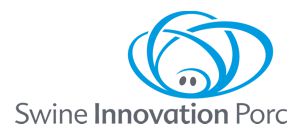
Swine Innovation Porc is proud to support the Banff Pork Seminar (BPS) once again this year.
For those of you who do not know us, our organization facilitates swine related research that will benefit the Canadian pork sector. The Banff Pork Seminar serves as an excellent venue for research results to flow back to all parts of the swine industry, an important part of our objective and focus. This year, two researchers who are supported through our current Swine Cluster 2 research program will host breakout sessions during the seminar. Keep an eye out for them: Candido Pomar and Fred Fortin.
For the first time this year, we are hosting our own pre-seminar information session at the Banff Springs Hotel on January 9 at 1 pm: PED & pig health: Where do we go from here? We invite you to join us at this session, where you will hear about important health issues facing the pork sector today and what is being done to address them. We are confident that this will be an informative and exciting start to the week's proceedings.
Check out our website www.swineinnovationporc.ca to register and learn more about us and the session. We hope to see you there!
Swine Innovation Porc is a Sustaining Sponsor of BPS 2018.
Last minute tips for BPS 2018 delegates
Date posted: December 20, 2017
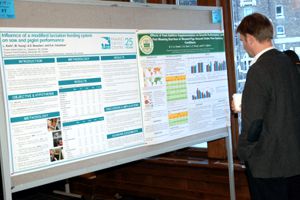
Here's a quick last-minute checklist for delegates to the 2018 Banff Pork Seminar (BPS) from Seminar coordinator Ashley Steeple.
The venue. The Banff Springs Hotel is where BPS began and the hotel staff and the BPS committee have worked hard to make it special for 2018. There are several restaurants and lounges right in the hotel so check out which best fit your needs.
Registration payment. If BPS has not received payment for your registration or your group's registration, delegates will not be able to check in and pick up their kits until payment is received. Please ensure the first person to check in from your group is prepared to settle the invoice. Payment by credit card, cheque or cash is accepted.
Breakout sessions. The breakout sessions delegates have selected are printed on their name tags. If you did not choose sessions, the person who registered your group may have chosen for you.
Note that breakout sessions have limited seating and once a session is full, fire regulations prevent BPS from allowing more people in. Please arrive at least five minutes before the session to avoid disrupting speakers and other delegates and to ensure you get to see the sessions you want.
Wednesday evening is open. There is no formal event planned for Wednesday evening. Delegates can meet after the day's breakout sessions and enjoy a refreshment from the cash bar in the tradeshow area, then head out on their own to enjoy the best of Banff.
Wear your nametag. Name badges will be required for entry into sessions, functions and meals.
Free wireless. There is free Wi-Fi in the hotel and meeting rooms. Password is "pork".
Check the BPS app. It will have all the program details delegates need for quick, easy access to program details such as breakout locations. App download details will be sent to each delegate registered.
Banff Airporter Shuttle discount. Anyone arriving by air and wishing to book the Banff Airporter Shuttle can get a discount by booking through the BPS website. Check under the Accommodations and Travel button, Airporter Shuttle tab for promo code and details.
Free downtown shuttles. These will be running between downtown and the Banff Springs during the evening. See the program for times and pickup locations.
Find the latest news at the Inside BPS 2018 Special Report. Get news, photos and the Inside BPS blog in this Special Meeting Report from the 2018 Banff Pork Seminar, presented by communications partner Meristem. Find the special report link on the BPS website home page or directly on the www.meristem.com home page. Inside BPS Report articles are available with credit for reprint for individual, industry or media use.
Follow BPS on Twitter. Latest news will also be at #Banffpork.
Final program handout. A PDF of the 2018 program handout with final details will be on the BPS website www.banffpork.ca in late December. Click on the Program button at the Home page, then on the printable Program PDF tab.
Seminar evaluations. These are critically important to planning future seminars so please fill them out.
The BPS team looks forward to meeting you in Banff.
Still time to register for Banff Pork Seminar 2018
Date posted: December 11, 2017

The spaces are filling up but there is still time to register for Banff Pork Seminar (BPS) 2018, Jan. 9 to 11, 2018 in Banff Alta.
"This promises to be a very good seminar with a strong number of delegates already registered," says Ashley Steeple, Seminar coordinator.
"There is a limit on registrations and while that number is within sight there is still time to get signed up," she says. "Regular registration deadline is December 20, 2017. After that date a late registration fee applies and there is no guarantee that all conference materials will be available.
"Conference registration fee is waived for full-time undergraduate or graduate students attending a Canadian post-secondary institution. However students must register by Dec. 20, 2017 or full conference fees apply.
"Media who wish to register should contact the BPS office at (780) 492-3651 or by email at ."
Full details and registration forms are available at the Banff Pork Seminar 2018 website www.banffpork.ca. Check out the Inside BPS blog and seminar special report available by linking from the BPS website. It has additional reports on speakers and events during this coming seminar. And follow along on Twitter at #banffpork.
Cutting edge technology highlights breakout session 5 at BPS 2018
Date posted: December 11, 2017
 Frédéric Fortin
Frédéric FortinThe cutting edge.
Three words that always intrigue and in the pork industry they represent future progress. Three speakers in breakout session 5 at Banff Pork Seminar 2018 will tackle those words under a session theme of "Newest innovations."
Frédéric Fortin, CDPQ will talk "Results and perspectives about automated water intake recording, infrared thermography and visual systems."
Mike Cronin, Cronin Family Farms will discuss his farm's experience with group housing of lactating sows as part of his presentation "Highlighting new and innovative technology from around the globe."
And Lee Whittington of the Prairie Swine Centre will discuss "Finding new technologies for the pork industry."
"Innovation is always a popular topics and this session ties directly to our seminar theme this year," says Ruurd Zijlstra BPS program co-chair. "We are looking ahead at the technologies on the horizon and some are already being implemented in some swine barns but are not used by everybody yet. All these technologies qualify as the cutting edge."
Registration and program details are on the Banff Pork Seminar website www.banffpork.ca.
These people helped shape a great program for BPS 2018
Date posted: December 11, 2017

It you want something done ask a busy person as the old saying goes. The people listed below took time from busy schedules to volunteer to be on the organizing committee for Banff Pork Seminar (BPS) 2018.
BPS is heading towards its golden anniversary in the next few years. That continued success occurs because people from the pork industry are prepared to make that commitment to serve.
One strength of the BPS advisory committee is that it is made up of strong players from all aspects of the industry, government and academia. The committee draws from people across Canada and is set up with a process of continual renewal, ensuring fresh thinking each year.
Here are the people on the 2018 BPS Advisory Committee.
- Chair: Mark Chambers, Sunterra Farms, Lucan, Ont.
- Program co-chairs: Michael Dyck and Ruurd Zijlstra, University of Alberta, Edmonton
- Conference coordinator: Ashley Steeple, University of Alberta, Edmonton
- Communication committee chair: Chris Tokaruk, TTT Stock Company Ltd., Regina, Sask.
- Javier Bahamon, Alberta Pork, Edmonton, Alta.
- Stéphane Beaudoin GestBEAu Inc., St-Germain-de-Grantham, Que.
- Amy Cronin, Cronin Farms, Bluevale, Ont.
- Daniel Godbout, PIC Health Assurance, St-Augustin, Que.
- Emmanuelle Lewis, Agri-Marche, St-Isidore, Que.
- Darcy Pauls, Cargill, Niverville, Man.
- Bill Rempel, Steve's Livestock Transport, Red Deer, Alta.
- Tom Riek, PIC Health Assurance, Airdrie, Alta.
- Casey Smit, Olymel, Humboldt, Sask.
- Redge Watt, Fast Genetics, Spiritwood, Sask.
- Ben Willing, University of Alberta, Edmonton, Alta.
- Jason Wood, Alberta Agriculture and Forestry, Edmonton, Alta.
The advisory committee is an open process. Anyone interested in serving on the committee or learning more about its role is invited to contact a current member.
Aherne innovators, student awards highlight special BPS Wed. breakout session
Date posted: December 1, 2017
Innovation and young scientists have always been important pork industry drivers and a common theme at Banff Pork Seminars (BPS) for many years.
So it is likely that again this year the special Wednesday afternoon "Innovators" breakout session at Banff Pork Seminar 2018 will have a strong turnout.
It will feature a brief overview and chance for questions from the audience for the winners of the Aherne Innovator Prize.
"The Aherne Prize continues to attract exciting innovations for the industry and once again this year we have had some really strong entries," says Dr. Ben Willing, chair of the Aherne selection committee. "The range of entries from small and simple to more complex technology is always interesting and explains the attention the audience shows each year."
Session 8 will also feature selected presentations from the R. O. Ball Young Scientist competition.
"This year we have expanded the range of the competition and as a result have entries from across North America," says Willing. "Delegates attend this session to see the cutting edge of science that these young people represent, and some will even admit it is a good opportunity to scout out talent."
The young scientist and Aherne winners will be acknowledged Thursday morning before the plenary session.
The latest on antibiotic developments, opportunities at Banff Pork Seminar 2018
Date posted: December 1, 2017
Few issues have dominated livestock production across all species like antibiotic use. Breakout session 7 at Banff Pork Seminar (BPS) 2018 features three strong speakers at the forefront of that issue. They'll talk progress, developments, challenges and the real opportunities that are emerging.
Veterinarian Dr. Egan Brockhoff looks at new antibiotic use guidelines coming to Canada, in particular regulation and industry guidelines. Changes have already occurred in Europe over the last decade, the U.S. last year and now Canada is following suit.
Dr. Clayton Johnson, Carthage Veterinary Services, one of the leading vet groups in the Midwest U.S. looks at how to get by without antibiotics in swine management systems and what the impact would be on biologic and economic performance of the herd.
The third speaker, Dr. Greg Wideman of South West Ontario Veterinary Services looks at practical on-farm management strategies in the transition to antibiotic-free production.
"We anticipate strong interest in this session," says Dr. Ruurd Zijlstra, BPS program co-chair. "Switching away from antibiotics means increased focus on animal health. But that landscape is changing.
"As this type of production becomes more common in North America there is an increasing pool of people who have direct experience with it. That allows us to draw several different people from North America to have as speakers."
All the information needed to register and select breakout sessions is available at www.banffpork.ca.
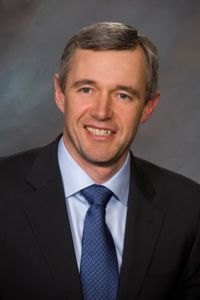 Egan Brockhoff
Egan Brockhoff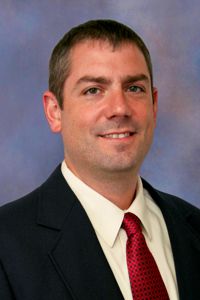 Clayton Johnson
Clayton Johnson Greg Wideman
Greg WidemanPIC welcomes friends and partners to BPS 2018
Date posted: December 1, 2017

PIC is looking forward to the 2018 Banff Pork Seminar. This event is one of the best opportunities in Canada to engage with our friends and partners in the Canadian pork industry on the challenges and opportunities that lie ahead. Especially the uncertainty around the market outlook, the increasing expectations of consumers on sustainability and animal well-being, and the possibilities that new technology offers — all will provide great food for thought.
From PIC's perspective, we are focused on developing the best genetics and services to support the Canadian industry in addressing the challenges and capturing opportunities.
We are excited about the future and look forward to meeting you in Banff.
PIC is a Sustaining Sponsor of BPS 2018.
Two veteran industry leaders talk savvy marketing at BPS 2018
Date posted: December 1, 2017
If combined years of experience and industry awards mean anything these two plenary speakers should be two of the best presentations at Banff Pork Seminar (BPS) 2018.
Markets always bring tough questions. Are pricing methods going to change? The way we use futures? How we manage price volatility? Many believe those things are going to get worse not better. What are some of the tools we can use over the next while to deal with that?
Dr. Larry Martin will have some of those answers during the Wednesday plenary session. Martin's talk is on Using Futures and Options to Manage Price Volatility. On Thursday morning, Dr. Ron Plain tackles "Hog market outlook and pricing methods."
Martin has built a reputation of melding economic theory with practical business application and real life training. The long time consultant and management training specialist spent the early part of his career as a professor and eventually department chair of agricultural economics and business at the University of Guelph. He was also CEO of the innovative industry think tank, George Morris Centre, and has served on several corporate boards of directors.
Plain brings a farm background and solid experience in production economics to his presentation including a long history of industry service. He is professor emeritus in the department of agricultural and applied economics at the University of Missouri-Columbia. Since coming to the University he has made over 2,200 presentations to farm audiences across the country and has authored over 500 published materials. He has been a speaker at past Banff Pork Seminars and one that delegates rate highly.
Sign up to hear these two plenaries at www.banffpork.ca.
 Ron Plain
Ron Plain Larry Martin
Larry MartinUnlocking the secrets of sow lifetime productivity: BPS breakout session 6
Date posted: November 21, 2017
If the sow is the engine of the pork industry then breakout session 6 at Banff Pork Seminar 2018 is the place to be.
"We are trying to identify various aspects of management and various considerations to make sure sows are being as productive as possible," says Dr. Michael Dyck of the University of Alberta, program co-chair for the seminar. "Three speakers will tackle that topic."
Mark Wilson of Zinpro Corporation looks at the "Footprint of sow management," not only how long a sow stays in the herd but also how long she is being productive. Health and nutrition will also be a significant part of that.
Dyck himself will talk on the boar side: Semen management and some of the reproductive technologies that can help to improve pregnancy rates, reduce non-productive days and improve litter size. "We often forget the boar produces half the litter and if we don't manage semen properly that can have an impact on how productive the sow actually is," he says.
Ad van Wesel from Cargill will discuss how sow nutrition and management carries forward to determine how robust the piglets are when they are born. The goal is to ensure that the piglets being born are actually reaching weaning in a viable and robust way.
All the information needed to register and pick breakout sessions is available at www.banffpork.ca.
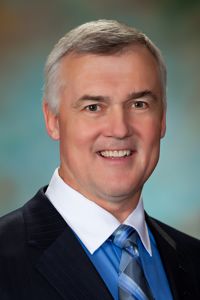 Mark Wilson
Mark Wilson Michael Dyck
Michael Dyck Ad van Wesel
Ad van WeselSteve Savage talks ag threats, barriers and opportunities at BPS 2018
Date posted: November 21, 2017

Steve Savage
Want to know the future of agriculture? Then you'll want to catch Dr. Steve Savage's plenary presentation at Banff Pork Seminar (BPS) 2018.
"Our theme for the 2018 seminar is 'Looking ahead to the next generation'," says Dr. Michael Dyck of the University of Alberta, BPS program co-chair, "and Steve Savage has walked the walk."
Savage brings a long history of experience in many aspects of the industry. Most recently he has been an independent consultant working with a wide variety of clients on topics including biological control, biotechnology, crop protection chemicals, post-harvest waste reduction, sustainability metrics, biofuels, and soil health.
He has also been active as a writer and speaker on food and agriculture issues at www.drstevesavage.com and he is a contributor to Forbes on these topics. He also has a podcast called PopAgriculture sponsored by the non-profit CropLife Foundation.
Savage speaks on Thursday morning at BPS 2018. Program details at www.banffpork.ca.
Solving the special challenges of feeding the grow finish pig
Date posted: November 21, 2017
The grow finish pig is the largest contributor to feed costs in the pork industry so there will be plenty of interest at Banff Pork Seminar 2018 on the best ideas to help improve that area of production.
Breakout session 3 has two speakers with excellent track records in the area, says BPS program co-chair Dr. Ruurd Zijlstra.
"Dr. Candido Pomar of Agriculture and Agri-Food Canada has several years' experience in precision feeding research," says Zijlstra "The last few years he has been collecting data on the benefits of feeding grow finish pigs as individuals while they are housed in a pen.
"It is amazing to see how his research tracking nutrient requirements and feeding individual animals according to their nutrient requirements leads to cost savings and substantially fewer nutrient excretion levels."
Dr. Bob Goodband from Kansas State University will follow with an update on amino acid requirements for the grow finish pig. That university has always had a very good group working on the practical application of swine nutrition, says Zijlstra.
Delegates have a choice of breakout sessions. Check out details at www.banffpork.ca.
 Candido Pomar
Candido Pomar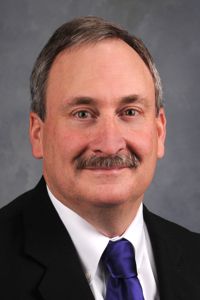 Bob Goodband
Bob GoodbandCheck out sponsor functions during Banff Pork Seminar week
Date posted: November 16, 2017
One sure sign of how Banff Pork Seminar has evolved into a week-long affair is the number of sponsor events that take place in and around the main program.
"Our goal is to make this seminar a destination event of networking and business building," says Dr. Michael Dyck, program co-chair for BPS 2018. "We have worked out a relationship with the Banff Springs Hotel where the special conference rates are available prior to and immediately following the main seminar.
"We know hotel bookings have been strong for 2018 and sponsors have been calling wanting to discuss options for hosting an event for their teams or clients. That is very rewarding because it means a stronger delegate base for the seminar and a better networking opportunity for everyone."
One special sponsor event slated for just before the official start of Banff Pork Seminar 2018 is a Tuesday afternoon presentation entitled "PED and pig health: Where do we go from here." Hosted by Swine Innovation Porc it features a slate of knowledgeable speakers on the subject.
There is no charge to attend but seating is limited and delegates are asked to register. Details are located at the Banff Pork Seminar website www.banffpork.ca. Click the Program button and then click "Sponsor Events."
Meet YouTube sensation Greg Peterson at Banff Pork Seminar 2018
Date posted: November 16, 2017
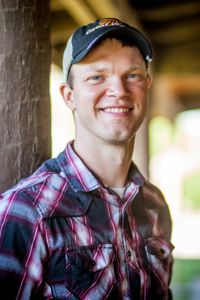 Greg Peterson
Greg PetersonIf one thing has defined the fast-changing society of today it has been social media and young people are at the forefront of it.
In agriculture there may be no better example of that than young farmer and YouTube sensation, Greg Peterson.
"Peterson used his university training in agriculture and communications to launch a YouTube channel with his farming family brothers. Today they tell the stories of agriculture to millions of viewers and have learned some real insight into representing agriculture and food to consumers, especially the millennial demographic," says Dr. Michael Dyck, of the University of Alberta, program co-chair for Banff Pork Seminar 2018.
"We wanted to close the seminar on Thursday afternoon with a positive and entertaining speaker that spoke to the future of agriculture," adds program co-chair, Ruurd Zijlstra. "Peterson accomplishes that on many levels. His success speaks for itself and it is why he is a popular speaker across North America.
His closing plenary session topic is 'I'm farming and I grow it: An AgVocating success story'."
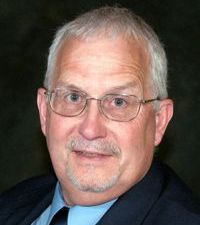 Max Hawkins
Max HawkinsGet the inside story on mycotoxins at BPS 2018 breakout session 1
Date posted: November 16, 2017
Delegates asked and this was the result. Banff Pork Seminar (BPS) 2018 will feature a special breakout session on mycotoxins.
"We're seeing the mycotoxin problem pop up more frequently in industry discussions," says Dr. Ruurd Zijlstra program co-chair for BPS 2018. "For example in western Canada mycotoxins such as vomitoxin and ergot are moving west from Manitoba. Even in our own herd at the university we have had to deal with mycotoxin issues.
"It is not just an issue on the horizon anymore, it is something on the increase. We got some good feedback on highlighting mycotoxins so we decided to feature them in a separate breakout."
 Don Giesting
Don GiestingMax Hawkins of Alltech will talk on the prevalence and effects of mycotoxins on Canadian and North American pork production. Alltech does a lot of work in this area including tracking mycotoxin prevalence and effects and Hawkins oversees that effort, says Zijlstra.
Don Giesting of Cargill Animal Nutrition will discuss "Mycotoxin detection and solutions." Cargill operates across North America and mycotoxins, which are increasing in the U.S. as well as Canada, have been a big part of their work.
Register and pick your breakout session at www.banffpork.ca.
Breakout 4: A new world of piglet management
Date posted: November 16, 2017
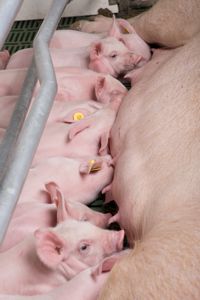
Here's a chance to learn from one of the big players in the industry on piglet management. Delegates can also learn about an innovative piglet management system successfully operating in difficult conditions in other parts of the world.
Breakout session 4 at Banff Pork Seminar 2018 features two speakers on the latest in piglet management.
Joel Spencer from JBS United will outline how that global company has been looking at both nutrition and health with regards to their products and general management. His presentation will specifically outline a number of things JBS has done to improve piglet management and wean as many healthy pigs as possible.
Second speaker Dr. Gustavo Pizarro with Pipestone Veterinary Services will explain an innovative pork production system being used in Latin America. It is a system that has faced a lot of challenges but has been able to improve piglet survival and production through some unique management approaches.
"It is an example of innovating in a challenging production environment and actually overachieving in that environment," says Dr. Ruurd Zijlstra, BPS program co-chair. "Many producers will identify with that."
Delegates can register and pick their breakout session at www.banffpork.ca.
Registration deadline reminder for Banff Pork Seminar 2018
Date posted: November 8, 2017
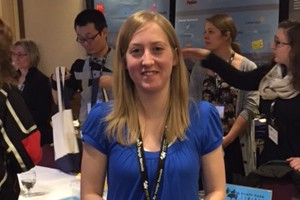 Ashley Steeple
Ashley SteepleJust a quick reminder from Banff Pork Seminar (BPS) coordinator Ashley Steeple that the early registration deadline is coming up Nov. 15, 2017. Here is a list of key registration deadlines and details. All registrations can be done online at www.banffpork.ca.
- Early registration ends November 15 and is $285.
- Regular registration runs until December 20 and is $335.
- Late registration of $385 applies after December 20 through to January 12.
- Group registrations cutoff is December 20.
- Media registrations please contact BPS Office
Note a free electronic copy of BPS 2018 proceedings will be included in delegate bags. Hard copies of proceedings are $20 plus GST and can be ordered from the BPS website.
A thank you to 2018 Banff Pork Seminar sponsors
Date posted: November 7, 2017
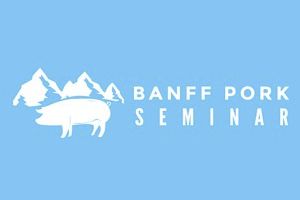
Once again the 2018 Banff Pork Seminar (BPS) has received strong sponsor support, and that means direct benefits for delegates.
"Sponsor support dramatically lowers the cost for each delegate attending this seminar," says program co-chair Ruurd Zijlstra. "To put on a conference of this scale without the financial support of sponsors would cost almost double what we charge."
Co-chair, Michael Dyck is appreciative of what the delegate sponsor teams bring to the whole seminar environment.
"Equally important to financial support is the knowledge, energy and personality that delegate sponsor teams bring," he says. "Networking adds a huge amount of value to the delegate experience throughout the week.
"Here are the 2018 sponsors listed in order of sponsorship category starting with the largest. BPS thanks them all for their support," says Dyck.
Sustaining Sponsors
- Alberta Pork
- Fast Genetics
- PIC
- Swine Innovation Porc
- Topigs Norsvin Canada
Premier Plus Sponsors
- AFNS, University of Alberta
- Cambridge Global Payments
- DuPont
- Hypor Inc.
- Maple Leaf Foods
- Maximus Systems
- Merck Animal Health
- Olymel
Premier
- Canadian Pork Council
- Cargill Animal Nutrition
- Conception Ro-Main Inc.
- DSM Nutritional Products
- Elanco Animal Health
- Farm Credit Canada
- New Standard West Equipment
- Sunterra Farms
Select Sponsors
- Agribution Canada Ltd.
- Alltech
- APC, Inc.
- AriVac
- Automated Production
- Big Dutchman Inc.
- Biomin Canada
- Boehringer Ingelheim (Canada) Ltd.
- Canadian Bio-Systems Inc.
- Canadian Hog Journal
- Champion Alstoe Animal Health
- Diamond V
- DNA Genetics
- EastGen
- h@ms Marketing Services
- Hylife
- JBS United
- Kemin Canada
- Manitoba Pork
- Masterfeeds, An Alltech Company
- Ontario Pork
- Penner Farm Services
- Prairie Hog Country
- Protekta Inc.
- Provimi North America
- SEC Repro / BOCK Industries
- South West Ontario Veterinary Services
- Walbern Agri-Systems.(1991) Ltd.
- Zinpro Corporation
- Zoetis Canada Inc.
Supporting Sponsors
- Alberta Barley
- AQINAC/Le Porc Show
- Chr. Hansen
- Jefo Nutrition
- Steve's Livestock Transport
- Warman Veterinary Services
Get practical help on managing media and messaging at BPS 2018
Date posted: November 3, 2017
 Jeff Ansell
Jeff AnsellIt's a media-driven world today and anyone in any part of the pork business needs to know how to handle difficult questions from media and stakeholders.
Banff Pork Seminar (BPS) 2018 can help. The Wednesday Plenary Session leads off with respected communications expert and award winning journalist, Jeff Ansell.
Author of the best-selling book "When the headline is YOU: An insider's guide to handling the media," Ansell has appeared on radio and TV, and in newspapers and magazines. He has also served as vice president of Hill and Knowlton, one of the world's largest public relations firms.
In his own consulting practice today Ansell counsels corporations, government and newsmakers often in tough, high-profile no win situations. For example, recently, he has been counseling U.S. police chiefs on race relations. He has also trained White House spokespeople, worked with BP's partner in the Deepwater Horizon disaster and advised PG&E in the Erin Brockovich case.
Ansell uses dramatic real world examples and unique and proven process to help clients successfully manage all types of media encounters. BPS delegates will learn ideas and approaches on how to create compelling messages, respond to difficult questions and frame negative news.
Fresh thinking on labor management at BPS 2018 breakout session 2
Date posted: November 3, 2017
 Trish Hyshka
Trish HyshkaNot many things are more challenging for the hog industry than finding and managing people. Here's a chance to learn how to personality test and profile to better understand the personalities of the people you work alongside.
Breakout session 2 at the 2018 Banff Pork Seminar (BPS) is an innovative workshop style session that will give all first hand, real time experience based on real industry techniques.
Trish Hyshka is a human resource manager for Sunterra Farms Ltd. and Sunterra Meats in Acme and Trochu, Alberta. With 24 years of experience behind her, today she serves as HR manager for the roughly 200 employees in the two divisions of the company.
She will walk delegates through her ideas and approaches to helping people progress and grow into bigger roles and training supervisors to be better leaders.
Sign up at www.banffpork.ca.
Media attendance an important part of Banff Pork Seminar
Date posted: November 3, 2017
 Media interviews
Media interviewsOver the more than 45 years it has been around speakers have shared a lot of important messages at the Banff Pork Seminar. One thing that has been consistent is the interest of media in the latest industry developments covered in those presentations.
Banff Pork Seminar 2018 will be no different. "Media are welcomed as always," says Chris Tokaruk, communications committee chair for the 2018 Seminar. "Their participation is critical to the seminar's role in education and knowledge transfer.
"The fact that a solid contingent of media attend these seminars and that they are free to share whatever information they wish, says a lot about the state of the pork industry in North America," he adds.
"These are excellent speakers at the seminar and the fact that this information on productivity improvement and public trust is shared openly through media and social media is important to both the pork industry and the general public."
Part of the BPS communications effort is a Special Report including the Inside BPS blog, feature articles and photos. These articles are available for media support and industry use. The link to the report is available at the Seminar website www.banffpork.ca.
Banff Pork Seminar 2018 will inform, challenge industry
Date posted: October 30, 2017

The big issues in the pork industry and the best people to interpret them, all in one of the most scenic places on the planet. That's what the 47th Banff Pork Seminar promises Jan. 9 to 11, 2018 at the Banff Springs Hotel in Banff, Alta.
"We always have a powerhouse program and the 2018 Seminar is no exception," says Seminar program co-chair, Dr. Ruurd Zijlstra of the University of Alberta. "Innovation, latest technology, challenging thinking on the big issues of the day combined with production information that producers can implement immediately."
"The Banff Pork Seminar has also become a business and social event that spans the better part of a week," adds program co-chair Dr. Michael Dyck. "It is a once-a-year unique opportunity for all aspects of the industry to frame up business meetings and take time to socialize with industry compatriots, all in beautiful Banff."
Wednesday's plenary session starts off with former journalist now strategic trainer for business and industry Jeff Ansell talking "When the headline is you." He's followed by well-known economist and researcher Dr. Larry Martin talking market trends and futures.
On Thursday, Steve Savage who has spent a lifetime in technology and communications speaks on "The future of agriculture: Challenges, threats, barriers and opportunities." He is followed by the always informative Dr. Ron Plain, economist from the University of Missouri-Columbus who will talk hog market outlook and pricing methods.
A closing plenary session on Thursday afternoon features Kansas farmer and advocate Greg Peterson whose innovative videos and social media advocacy approaches reach millions of people. His topic is "I'm farming and I grow it - An AgVocating success story."
A selection of breakout sessions each morning and afternoon tackle topics that most directly affect production. Topics include mycotoxins, farm labor, feeding the grow-finish pig, piglet management, newest innovations, sow lifetime productivity, and swine health and antibiotics. Wednesday also features a special innovators' breakout session.
Banff Pork Seminar extends Banff Springs Hotel contract
Date posted: October 27, 2017
The Banff Pork Seminar has extended the contract with the Banff Springs Hotel until 2021.
That is a good thing for the Seminar and a very good thing for delegates, says conference coordinator, Ashley Steeple.
Delegates can book rooms at the special conference rate for three days prior to the seminar and three days afterwards, says Steeple. That is a tremendous saving off regular hotel rates and allows people to book extended business meetings or personal vacation time around the seminar itself.
In addition, the seminar agreement provides delegates with a reduced rate on parking, great tradeshow and meeting areas and wonderful dining and entertainment opportunities.
Hotel rooms are already moving briskly for the 2018 seminar, says Steeple so it is a good idea to book early.
Student science abstract deadlines Oct. 31, 2017
Date posted: October 5, 2017
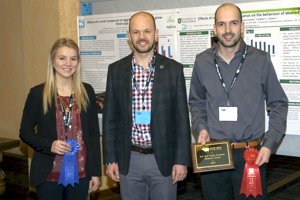 2017 winners
2017 winnersThe R. O. Ball Young Scientist Award presented at the Banff Pork Seminar (BPS) is a coveted one among young scientists.
The award is named after Dr. Ron Ball, a long-time researcher and former BPS program director. The award recognizes graduate and undergraduate students who provide a best overall combination of good and relevant science, a well-written abstract and an excellent presentation.
Deadline for abstracts for the 2018 Banff Pork Seminar student competition is October 31, 2017.
2018 Banff Pork Seminar Aherne Prize entry deadline Oct. 31, 2017
Date posted: October 5, 2017
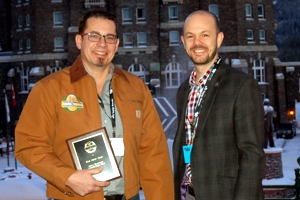 2017 winners
2017 winnersEach year the Banff Pork Seminar (BPS) awards the F.X. Aherne Prize for Innovative Pork Production. It has become an annual Seminar highlight. Entry deadline for the upcoming 2018 BPS Aherne Prize is Oct. 31, 2017.
Dr. Ben Willing of the University of Alberta, committee chair for the selection committee, says the Aherne prize represents the power of innovation in the pork industry in Canada and around the world.
It recognizes individuals who have developed either original solutions to pork production challenges or creative uses for known technology. Innovations big or small, complex or simple can be entered. Contest details are on the Seminar website www.banffpork.ca.
"The contest is open to owners, production managers, herdspeople or consultants in the North American pork industry, or anyone who has developed an innovation relevant to the North American pork production industry," says Willing.
"All segments of the pork industry qualify," he says. "That includes areas such as feeding, breeding, ventilation, disease control and prevention, transportation, manure management, animal handling, facility or enterprise management, and pork quality and safety."
The prize is valuable, says Willing. It includes free 2018 BPS conference registration, accommodation at the world-renowned Fairmont Banff Springs Hotel and travel for the Banff Pork Seminar Jan. 9 to 11, 2018 for up to two innovators. The value of that registration and travel is approximately $2,000 each. Along with that is the pride of having innovations featured at this leading global pork industry conference.
The award is named after the late Dr. Frank Aherne, a professor of swine nutrition and production at the University of Alberta in Edmonton and a major force for science-based progress in the western Canadian pork industry.
Stay tuned for the latest news on Banff Pork Seminar 2018
Date posted: October 5, 2017

When you have been a leading seminar globally for as many years as the Banff Pork Seminar (BPS) has, one thing is constant: Change. A constantly changing industry means constant refinement in the features, business development, social and networking opportunities of this seminar.
This annual Special Report is called Inside BPS Special Meeting Report 2018. Produced by Meristem editors in partnership with the BPS organizing committee, it is designed to take you "inside" Banff Pork Seminar Jan. 9 to 11, 2018, to help you keep on top of those developments.
Delegates travel from across North America and around the world for solid reasons. The speakers consistently represent the leading edge of a rapidly evolving modern, global pork industry and provide a window into agricultural issues and developments. The delegates they attract provide an unparalleled networking opportunity for all. Delegates can also have even some fun socializing in this world renowned resort community and hotel.
The information in this Special Report – including blog items and news features – is designed to be available for use by media and industry, with credit to the source. Here are a few key points on the full BPS 2018 communications effort.
The BPS hub. The best place to get everything you need to know about the 2018 Seminar, Jan. 9 to 11 is the Seminar website www.banffpork.ca. You can sign up for e-news advisories from Seminar coordinator, Ashley Steeple.
Inside BPS blog. These blog items will provide key information and perspective prior to, during and immediately following the 2018 seminar. Blog items are designed for use by media, industry communications specialists, producers and others in the industry. Simply provide a credit line to the Inside BPS Special Report and a live link to the Meristem website www.meristem.com.
News releases and news features. While these articles are primarily designed for media and industry communications specialists, they are available for anyone to use and are available for reprint. News releases can be used without requirement to provide credit. News features should be credited to the Banff Pork Seminar 2018 and linked to www.meristem.com.
Photos. Selected speaker photos will be provided and are available for use. Please credit the Banff Pork Seminar.
Media assistance. As in past years, media assistance is available. You can find contact information and other key details under the "Media Assistance" link in the top right column of this Special Report web page.
Social media. Information and links to stories on BPS will also be featured on social media. Watch for regular updates under the #BanffPork hashtag. Follow the Banff Pork Seminar at Twitter handle @BanffPork and on the BPS Facebook Page. Follow NewStream by Meristem at Twitter handle @NewStreamTweets.
Banff Pork Seminar organizers have worked hard this past year to make your time in Banff a truly memorable one. Welcome to Banff Pork Seminar 2018.


